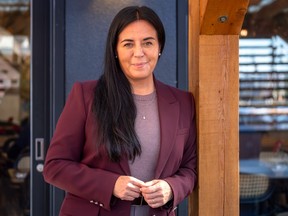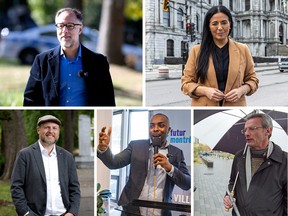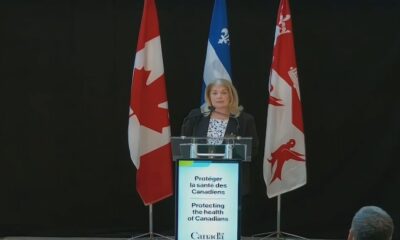Business
Montreal’s Transit Commitments: Evaluating Valérie Plante’s Progress

Montreal’s Mayor, Valérie Plante, has faced scrutiny regarding her transit commitments since taking office in 2017. With the city continually bustling with activity—from cars and buses to the metro system—many residents are eager to understand the progress made on the promised enhancements in public transportation. A recent analysis examines what has been achieved and what still lies ahead.
As Montreal’s population grows, the demand for efficient transit solutions has never been more pressing. The city has made strides in various areas, but residents often feel that the pace of change does not match the urgency of the situation. Plante’s administration set out ambitious goals to improve the public transit network, which includes expanding metro lines and enhancing bus services.
One of the most significant commitments made by Plante was the extension of the blue line of the metro, a project that aims to increase accessibility for residents in underserved neighborhoods. According to the Société de transport de Montréal (STM), this extension is projected to be completed by 2026, but concerns remain about delays and budget overruns.
Assessing Key Commitments and Achievements
In addition to the metro expansion, the Plante administration has focused on improving bus services across the city. Initiatives such as dedicated bus lanes and a revamped scheduling system have been introduced to enhance the reliability of these services. The STM reported that in 2022, bus ridership increased by 15% compared to the previous year, indicating a positive response from the public to these changes.
Another noteworthy achievement is the expansion of the Bixi bike-sharing program. Since its launch, Bixi has become a popular mode of transport, providing an eco-friendly alternative for short trips around the city. In 2023, the program saw a record number of users, with over 1.5 million rides reported, showcasing a growing commitment to sustainable transportation options.
Despite these advancements, challenges remain. Critics point out that the city has not adequately addressed congestion issues, particularly in high-traffic areas. The expansion of bike lanes, while beneficial for cyclists, has been met with mixed reactions from drivers and local businesses, who argue that it has led to increased congestion on the roads.
Future Outlook and Community Impact
Looking ahead, Plante’s administration has set new targets for the next few years, including the introduction of electric buses and a push for greener public transport solutions. The city aims to have 50% of its bus fleet electrified by 2030, aligning with broader environmental goals.
Community response to Plante’s transit initiatives remains varied. While many residents appreciate the progress made, others express frustration over ongoing delays and the perceived disconnect between promises and execution. Local advocacy groups continue to push for more transparency and quicker action on transit-related projects.
In conclusion, while there have been notable advancements in Montreal’s public transit under Valérie Plante, the journey is far from complete. As the city grapples with increasing demands for mobility, the administration’s ability to deliver on its commitments will be critical in shaping the future of public transportation in Montreal.
-

 World3 months ago
World3 months agoScientists Unearth Ancient Antarctic Ice to Unlock Climate Secrets
-

 Entertainment3 months ago
Entertainment3 months agoTrump and McCormick to Announce $70 Billion Energy Investments
-

 Science3 months ago
Science3 months agoFour Astronauts Return to Earth After International Space Station Mission
-

 Lifestyle3 months ago
Lifestyle3 months agoTransLink Launches Food Truck Program to Boost Revenue in Vancouver
-

 Technology2 months ago
Technology2 months agoApple Notes Enhances Functionality with Markdown Support in macOS 26
-

 Top Stories7 days ago
Top Stories7 days agoUrgent Update: Fatal Crash on Highway 99 Claims Life of Pitt Meadows Man
-

 Sports3 months ago
Sports3 months agoSearch Underway for Missing Hunter Amid Hokkaido Bear Emergency
-

 Politics2 months ago
Politics2 months agoUkrainian Tennis Star Elina Svitolina Faces Death Threats Online
-

 Technology3 months ago
Technology3 months agoFrosthaven Launches Early Access on July 31, 2025
-

 Politics3 months ago
Politics3 months agoCarney Engages First Nations Leaders at Development Law Summit
-

 Entertainment3 months ago
Entertainment3 months agoCalgary Theatre Troupe Revives Magic at Winnipeg Fringe Festival
-

 Politics1 week ago
Politics1 week agoShutdown Reflects Democratic Struggles Amid Economic Concerns





















